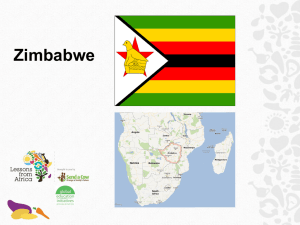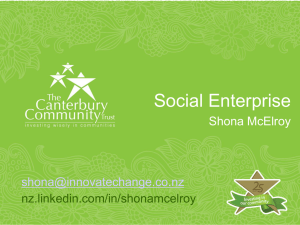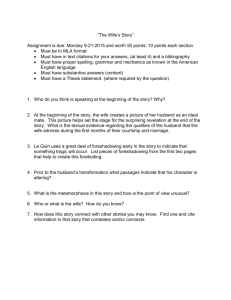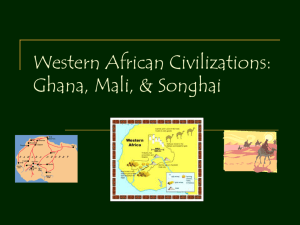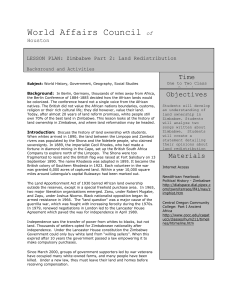Document 10467164
advertisement
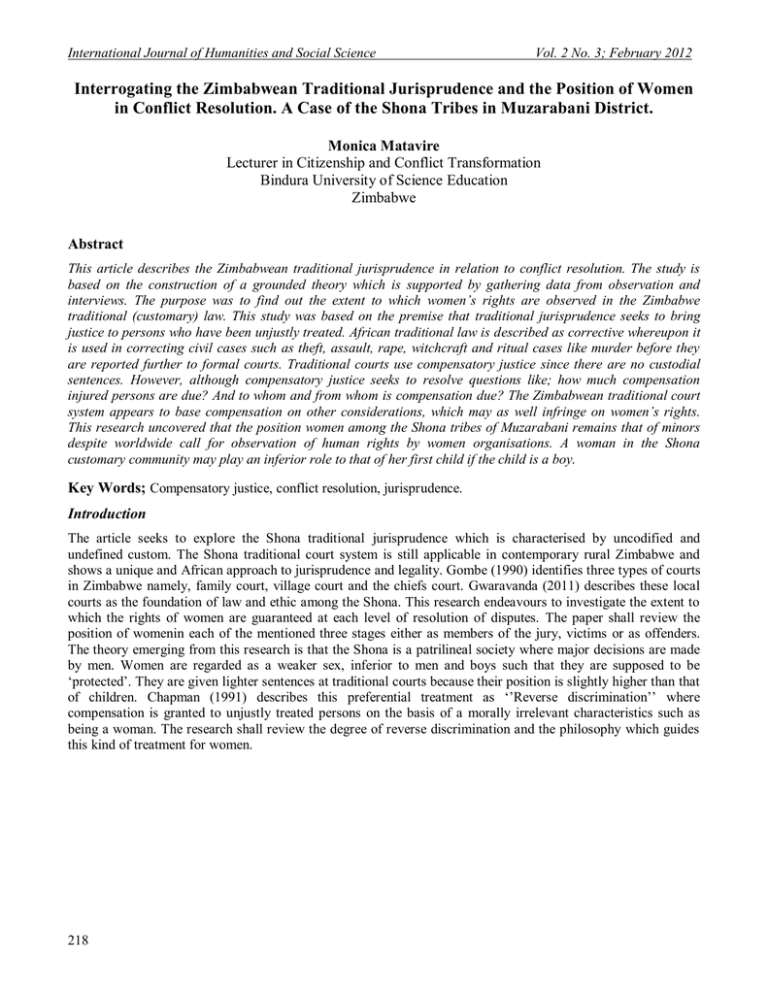
International Journal of Humanities and Social Science Vol. 2 No. 3; February 2012 Interrogating the Zimbabwean Traditional Jurisprudence and the Position of Women in Conflict Resolution. A Case of the Shona Tribes in Muzarabani District. Monica Matavire Lecturer in Citizenship and Conflict Transformation Bindura University of Science Education Zimbabwe Abstract This article describes the Zimbabwean traditional jurisprudence in relation to conflict resolution. The study is based on the construction of a grounded theory which is supported by gathering data from observation and interviews. The purpose was to find out the extent to which women’s rights are observed in the Zimbabwe traditional (customary) law. This study was based on the premise that traditional jurisprudence seeks to bring justice to persons who have been unjustly treated. African traditional law is described as corrective whereupon it is used in correcting civil cases such as theft, assault, rape, witchcraft and ritual cases like murder before they are reported further to formal courts. Traditional courts use compensatory justice since there are no custodial sentences. However, although compensatory justice seeks to resolve questions like; how much compensation injured persons are due? And to whom and from whom is compensation due? The Zimbabwean traditional court system appears to base compensation on other considerations, which may as well infringe on women’s rights. This research uncovered that the position women among the Shona tribes of Muzarabani remains that of minors despite worldwide call for observation of human rights by women organisations. A woman in the Shona customary community may play an inferior role to that of her first child if the child is a boy. Key Words; Compensatory justice, conflict resolution, jurisprudence. Introduction The article seeks to explore the Shona traditional jurisprudence which is characterised by uncodified and undefined custom. The Shona traditional court system is still applicable in contemporary rural Zimbabwe and shows a unique and African approach to jurisprudence and legality. Gombe (1990) identifies three types of courts in Zimbabwe namely, family court, village court and the chiefs court. Gwaravanda (2011) describes these local courts as the foundation of law and ethic among the Shona. This research endeavours to investigate the extent to which the rights of women are guaranteed at each level of resolution of disputes. The paper shall review the position of womenin each of the mentioned three stages either as members of the jury, victims or as offenders. The theory emerging from this research is that the Shona is a patrilineal society where major decisions are made by men. Women are regarded as a weaker sex, inferior to men and boys such that they are supposed to be „protected‟. They are given lighter sentences at traditional courts because their position is slightly higher than that of children. Chapman (1991) describes this preferential treatment as „‟Reverse discrimination‟‟ where compensation is granted to unjustly treated persons on the basis of a morally irrelevant characteristics such as being a woman. The research shall review the degree of reverse discrimination and the philosophy which guides this kind of treatment for women. 218 © Centre for Promoting Ideas, USA www.ijhssnet.com Geographical Background of Zimbabwe It is located in central southern Africa and is bordered by Zambezi River to the north and Limpopo River to the south. The country‟s central statistics office records for 2010 reveal that Zimbabwe is home to 11,5million people and that about 65% of this population live in rural areas. Of the country‟s population around 55% are women. Women constitute the majority of the country‟s population. Muzarabani which is the area of research is situated between Harare and Kariba to the north. Muzarabani is inhabited by approximately 800 000 people most of which are Shona speakers who claim descends from great pre -colonial personalities like the Mwenemutapas. Conceptual framework The research is premised on the African principle of Unhu, Which means personhood. Personhood (unhu) is derived from ones historicity and rootedness in an on-going community Menkit (1976). It is the community which defines an individual as a person, and the same community defines traditional values and ethics that are to be upheld by the members of the customary community. Any violation of these ethical values is an offence to the whole community and is punishable. The Shona believes man has a certain conception of morality which is intrinsic to him and his nature. Morality according to the Shona is determined by society‟s beliefs and traditional chiefs are custodians of these beliefs and values. The Shona traditional chieftaincy reconciles disputants using the principle of unhu (personhood) as the guiding principle from which to refer to. The key objective of traditional jurisprudence is to bring equilibrium to disequilibrated relationships. In this case the Shona penalties are not meant to permanently hurt individuals but to the restoration of this equilibrium. Methodology The design selected for this research is the qualitative intervention research design as well as the construction of a grounded theory, which allows for observation of traditional court sessions at different stages. This method recognizes that researchers come to study with background knowledge that influences their point of view towards the object of study. This researcher decided on observation as the primary method of data collection to assure that the researcher‟s previous knowledge would not bring biases to the conclusions the researcher made. Other methods used included interviews to complement observation for triangulation purposes. Results In the Shona traditional jurisprudence there are many stages that a case may pass through before it is heard at the highest traditional court presided by the local traditional chief. Stage one –family court This lower court comprises a council of elders responsible for settling intra family disputes. Women are allowed to participate in court sessions as advisors or as judges. This lower court try minor cases like theft, disputes between parents and their children, disputes involving in laws especially those stemming from ill treatment of wife by her in was or by her husband. 219 International Journal of Humanities and Social Science Vol. 2 No. 3; February 2012 They also organise a son‟s remarriage when the first „wife proves to be barren.‟It is the duty of elderly members of the family like aunts, uncles,grandmothers and grandfathers to resolve these family disputes at family level. The rationale is that family disputes should not be revealed to outsiders for this will destroy family integrity and dignity. Women participate in family matters as long as they are older enough to give advice to young people. These family advisors are expected to be knowledgeable about family affairs and culture. They should be respectable members of the family who are custodians of family values and laws. Traditional family laws are based on the supremacy of the male members of the house hold as well as on the subordination and dependency of women. Those who sit in the family court (council) are endowed with the duty to give advice to girls on how to look after their husbands and the husband‟s family. Boys are likewise taught by uncles to fend for their families and to look after their wives without losing the grip and control of the family as heads. Women‟s marital duty is to feed and clothe the family.Child bearing is another duty of a married person failure of which the woman may be returned to her family and bride price demanded back. The issue of the bride price which can be as high as US20 000 accompanied byany number of cattle depending on the groom‟s ability to pay makes women subjects to their husbands. Inferior decision making power of women arises from the surbordinate position that is created the moment bride price is paid. The husband remains the undisputed head of the household. This research has gathered that there are several families in Muzarabani where the husband is so dominant that he can either stop the wife from working even if the wife is educated or the husband can take complete administration of the wife‟s salary. Thus in matters such as marriage, divorce, child custody or guardianship, women are often in situations where they have lesser rights. The following is a riveting story of a 17yearold girl who was raped by her uncle three years back (2007).The family court resolved to keep it an in house affair because reporting the case would result in the uncle who was the family bread winner incarcerated. Again the family name and that of the uncle would be soiled if the case was made public.The family court never considered the girl‟s emotions and trauma she was going through. The safety of the uncle was more important than the feelings and dignity of the girl. This case reveals that justice in the African concept is meant to advance the wellbeing of the community members of the collective group. In many cases the emphasis on collective group are inconsistent with member‟s rights as individuals.Thusthe wellbeing of an individual, such as a party to a dispute,mostly assumes a secondary a secondary consideration to the community‟s wellbeing.Individual rights though enforced do not supersede the collective rights. The girl‟s parents were compensated into silence with a cattle and some undisclosed amount of money. They too were poor and often relied on hand outs from the family uncle. This research has established that in Muzarabani, the family remains a unit of congruent interests, it‟s an institution whose members make joint decisions in order to maximise family goals despite the goals being skewed towards the man.The case of the 17 year old girl only came out when she got married and the husband demanded to know who deflowered her.The newly married woman was exposed to a routine of verbal abuse and assault from her husband who called her all sort derogatory names because she had lost her virginity before customary marriage. The case was further reported at the chief‟s court whose decision will be explored later. Stage two-headman’s court This is the second court where cases can be referred to from the family court. Cases can be appealed from these courts to the chief‟s court up to the formal magistrate‟s courts if members are dissatisfied with the ruling. Headman‟s court can entertain cases where damages are less than US100.00. They resolve disputes like minor thefts, fights, assault. Kraal heads preside over the cases. In most cases the kraal heads are men because being a kraal head (village head) is a hereditary appointment that has been a preserve of men. In Muzarabani, there are fifteen village heads under chief Muzarabani. None of these is a woman. Despite calls by the government to consider women candidates for village headship and traditional chieftainship, women have been side lined and relegated to subservient positions. This has been influenced by the pre-colonial concepts of Dare (court) which was a men‟s council and was a taboo for women to sit in the men‟s council. Women can attend these village courts as victims, witnesses or as part of the audience who may be asked to vote for a decision in the event of a stalemate. During the course of court proceedings, it is common to hear utterances like, „we do not tolerate womanish talk here because the matter we have is crucial‟, or „If you don‟t have anything to say you can join women in the kitchen.‟ These utterances are usually directed at men who may be considered thoughtless like „women‟. 220 © Centre for Promoting Ideas, USA www.ijhssnet.com Stage-three –Chief’s court The highest traditional customary court is the chief‟s court. This chief settles disputes with the help of advisors who are chosen on the basis of intelligence, knowledge of the customs and eloquence of speech. This court transcends the limitations of both family and village court to involve the larger community. Community elders along with the traditional chief are the judges in judicial proceedings. These elders may in rare cases include women especially relatives of the chief or any women linked to the chief on hereditary line. Out of three chief in Muzarabani, none of them is a woman. For as long as history itself, there has not been a woman chief in this area. Traditionally, there were instances when a male cousin or nephew was appointed to chieftainship if coincidentally the immediate heir to the throne was a woman.However, thereare instances when the government had to intervene in succession disputes especially in areas where a female candidate would be involved.In Matabeleland, a southern province of Zimbabwe populated by Ndebele the government settled the disputes by appointing the women as chiefs. Unfortunately for the female chiefs, some elders of the same clan did not accept the appointments as legitimate. Okafo (2006) observed that the African tradition respects relevant traditions, commands and political sovereigns or superiors. The commands of superiors envisaged here are those that emanate from legitimate tradition based leaders that are generally supported and accepted by the locals. In this case, the tendency by government to intervene in traditional leadership succession disputes and appointing government loyalists as traditional ruler does not qualify such appointees as legitimate leaders. Inversely, appointing a female to chieftainship in the name of human rights in cultures that view it as a taboo would not make the female a legitimate leader because a leader has to be accepted by the locals. In theShona traditional jurisprudence the chief presides over cases that are below US $500. The problem with this limitation is that magistrate‟s courts are far from rural areas and as a result chiefs end up trying cases which are beyond their jurisdiction. In damages, women are allowed to attend the court proceedings as well as to participate in the jury but not as judges or adjudicators but as advisors to a council of men .There are also instances when women are consulted before judgment is passed. Consultation is based on the assumption that wisdom is not a monopoly and sharing ideas enriches individual perceptions and insights on the matter. Chief‟s courts are empowered to hear a variety of civil matters in which customary law would appear to be applicable provided that the defendant is a resident of the area in which the court operates or that the defendant agrees to be tried by that court.Judgment in traditional court system may take the form of monetary awards, cattle, goats, sheep or fowls depending on the gravity of the offence. Dissatisfied parties are allowed to appeal against chief‟s judgment to the provincial magistrate‟s courts. Chiefs are not allowed to dissolve registered marriages but may dissolve marriages registered under customary marriages Act chapter 238 (Law society of Zimbabwe 2009). A follow up on the 17 year old girl who had been raped by her uncle was made as the matter had been referred to chief Muzarabani‟s court. The decision of the chief was that the uncle pays the damages to the husband who had married this victim in form of cattle (two to be precise) The husband was only allowed to claim the cattle if he intended to stay with his wife in peace. The parents of the girl would receive the compensation if the husband was no longer interested in marrying a once abused girl. The defendant agreed to pay the damages in any form for fear of a stiffer penalty if the case was reported at formal courtsThis was because the crime was committed when the girl was still a minor.In Zimbabwe, The Legal Age of Majority Act (LAMA) stipulates that 18 years is the legal age for one to marry,decide on his/her own and vote because one is nolonger considered a minor. The case stated above is testimony to the patrilineal society of the Shona and its jurisprudence.Giving compensation to either the husband or theparent of the victim is an indication of the inferior position of a woman in this case. One of the tenets of compensatory justice which informs traditional jurisprudence is to answer questions on who should be compensated. The case above is an example of the infringement on human rights because compensation is based on culture which places a woman under the custody of her husband. The compensation this lady got was a verbal promise of peace from the husband whose behaviour can even change after receiving the compensation. This husband‟s desire to own cattle may have influenced his decision to accept and stay with the wife. It‟s a case of reaping where he did not sow. Another case was that of a woman who sought marriage dissolution and custody of their seven year old boy from the traditional chief‟s court. Her husband had married a new wife and was staying in Harare (Capital of Zimbabwe) with the boy and abusing him. The traditional court granted the woman custody of the child after hearing narrations of how he sometimes slept without food, physical assault and verbal abuse. On the issue of customary divorce the court ruled that the lady had no sound grounds for divorce because polygamy was not a new principle in Shona tradition. 221 International Journal of Humanities and Social Science Vol. 2 No. 3; February 2012 She was asked to stay on the rural family home waiting patiently for the husband‟s return because the said new wife was not recognised by the Shona custom. The court also explained that if she decided to leave the husband she would lose the property they accrued together including inheritance to land. She decided to endure the pain of abuse, harassment and torcherin silence so that she could not be evicted from the family rural home. Due to patriarchal norms, male dominated village courts and traditional laws, women who are married out, widowed or single are in most cases deprived of access to land. The land may be inherited by a brother in law or the first child of the widow if the child is a son.According to customary law a lady cannot be appointed heir to family estate when there is a man, even if the man is younger than the woman. According to the Administration of Estates Act operational in Zimbabwe, if any African who has contracted a marriage according to African law or customor who, being unmarried, is the offspring of parents married according to African lawor custom, dies intestate his estate shall be administered and distributed according to the custom and usages of the or people to which he belonged (law society of Zimbabwe hand book 2005).In cases concerning divorce women are not allowed by tradition to divorce their husbands except on cases of infidelity. Wife beating can be pardonable because a husband who beats up his wife is a caring husband who disciplines his wife so that she will not make mistakes. Women can be treated the same way as children. Given this background the rights rhetoric remains largely verbal because it is not always translated into action. Despite efforts being made by the government of Zimbabwe as a signatory to the Convention on the Elimination of all forms of Discrimination Against Women (CEDAW) the majority of women in rural Zimbabwe are still violated against in the name of culture and tradition. This is because „‟In the country side there is no law, what is relevant is custom” This comment by Cutshall (1991) is true of the situation in rural Zimbabwe. EVALUATION OF THE TRADITIONAL JURISPRUDENCE The traditional courts have regard for customary judicial practices. They place a good deal of emphasis upon simplicity and informality inorder to achieve amicable dispute settlements which restore and promote social harmony within the community. The traditional juris\prudence dictates that presiding officers judge the case and not the person so that permanent resolution of disputes and unity would prevail. The traditional jurisprudence accommodates and accepts that in life conflicts are inevitable parts of all human association. The system recognizes that if conflict is supressed, it can result in stagnation and erode the bond of group solidarity because of an accumulation of hostility. The traditional jurisprudence‟s strengths are that it is open and promotes reconciliation between disputants. It discourages fighting, tension and suspicion. Traditional trials are inexpensive because there is no legal representation. Chiefs discourage people from breaking the law. Since there is no custodial sentence traditional court system helps to decongest the formal courts. It is the kind of law they are used to and people are familiar to the customary judicial language and proceedings. This research has gathered that traditional jurisprudence operates within parameters and guidelines of Unhu (personhood).Despite these guiding principles, there are several limitations and challenges to the traditional jurisprudence. Traditional court system excludes women in decision making because they are regarded as minors who must be represented by their husbands or fathers in matters affecting them. In most cases, their opinions are not represented well. During court proceedings, women are in a weaker position to challenge men because they always override women‟s decisions. The fact that there is no legal representation, cost heavily on individuals who are not eloquent and those who cannot argue their cases out. The institution of African jurisprudence has been polarised by politicians who at times influence the selection of traditional chiefs. The result is that chiefs selected clandestinely do not command the same respect and legitimacy with those chosen through customary means. The concept of Unhu (personality) which the traditional jurisprudence derives its guiding principles from is not unique in every individual presiding either as a chief or an elder. There are some chiefs whose Unhu (personality) is as bad as criminals themselves. Although traditional chieftainship is still highly esteemed, it is fast losing its past glory because of some corrupt elders and chiefs who use their positions to advance their own personal agendas. Some chiefs are known to canvass bribes from offenders so that they will judge in the offender‟s favour. Traditional customs are intentionally abused by those who want to derive benefits from it. 222 © Centre for Promoting Ideas, USA www.ijhssnet.com CONCLUSTION AND RECOMMENDATION Following the discussed outcomes of this research, this paper recommends that; Upon appointment to chieftainship, chiefs should undergo some judicial orientationand must be kept aware of the changes that are taking place in the world as far as human rights are concerned. Traditional chiefs should attend world conventions and conferences on human rights so that they will not look down upon women and children. Instead of being custodians of traditional values some of which have lost touch with the present generations, traditional leaders should use their influence to broadcast concepts of human rights such as equity and equality. There must be no gap between traditional jurisprudence and formal in the way they try cases and the way sentences are passed so that criminals will not have a lesser evil choice. Women should be economically empowered so that they will not rely heavily on their spouses and their in laws, because the research has discovered that women who are not educated and are not gainfully employed are abused and their rights are violated because of lack of knowledge. They cannot challenge men because they are over reliant on them. CEDAW should monitor the implementation of existing legislation, and challenge those that impeach on women‟s rights since it is a universally recognised norm setting instrument. References Aquirre, A., and Baker, D. (1991). Race, racism, and the death penalty in the United States. Berrien Spring, MI: VandeVere. Bourdillon, M (1981). The Shona peoples: ethnography of the contemporary shona with special reference to their religion. Gweru: Mambo Press. Bourque,S., and K Warren(1981) Women of the Andes: Patriarchy and social change in two Peruvian towns. University of Michigan press. ChapmanJ.W.(1991) Compensatory justice.New York: University press. Cutshall, C.R (1991).Justice for the people.Community courts and legal transformation in Zimbabwe.Zimbabwe university press. David. M (1999). Christians and chiefs in Zimbabwe: A social history of the Hwesa people, 1870-1990s. Volume 20.Dawson, M. (2004) @www.eup.ed.ac.uk Drieberg, J.H. (1934) “The African conception of Law”, Journal of Comparative Legislation and International Law, Vol XV1 Feltor, (1990) „Sentencing Persons who kill witches. Legal forum vol 2 p37 Gelfand, M (1981). Ukama, Gweru, Mambo Press. Gombe, (1980)Tsika DzavaShona. Harare. College press. Grotius, (1953). De Jure Belli ex Pacis, Cambrigde: University press. Gwaravanda, E. T (2011).Philosophical principles in the shona traditional System. International journal of peace and development.Vol 2 (5) Hamutyinei M A, and Planner (1987) Tsumo-shumo: Shona proverbial lore and wisdom, Gweru: Longman Hoodford, J.Jr (1969). Adjudication considered as process of conflict Resolution: A variation on separation of powers, YaleUniversity press. Law Society of Zimbabwe Handbook 2011. Menkiti,A.inWright,R. (1986).African Philosophy. London: University press. Pound, R (1954) an introduction to the philosophy of law.New Haven: Yale university press. Robson, C. (2002) Real world Research: A source for social scientists and practitioner researchers. 2 nd (Ed) Oxfords Blackwell Samkange,Tand Samkange, T.(1980) Hunhuism/Ubuntuism: A Zimbabwe Indidenous political political philosophy. Harare: Graham publishers. Thomas, D.A. (1988). Sentencing: some current questions. Current legal problems: Cambridge. Walliman, N and Buckler (2008). Your dissertation in education, London: sage. 223
